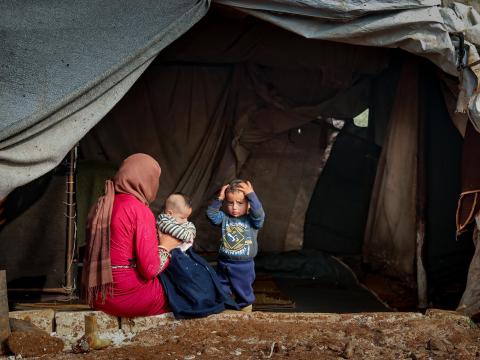Mental Health of Women Forced to Flee Ukraine, Syria and Afghanistan suffers as they struggle to survive

- Cold weather and the inability to keep their children fed and warm, is taking a serious toll on the mental health of displaced female family heads
- Displaced female-headed households putting themselves and their families at risk by utilising last resort heating methods in desperation
- Willing to work, displaced women find employment opportunities precarious or non-existent plunging them deeper into poverty or forcing them to take on debt burdens as never before
As winter rapidly approaches, a new report by international aid agency, World Vision, reveals three of the world’s biggest displacement crises are seeing a common thread; displaced female-headed households are struggling to cope with harsh winter conditions, forcing them to take desperate measures, with the stress of the situation leading to mental health deterioration.
World Vision’s new report, Out in the Cold, examines how displaced female-headed households from or within Ukraine, Syria and Afghanistan will cope with the harsh climate conditions of winter and how a household head’s gender can significantly exacerbate the vulnerability of the household during winter. The study finds the rising costs of commodities and winter essentials puts displaced female-headed households at greater risk than other vulnerable groups because of the social stigma they face, and because help is often out of reach.
“Accessing income creates several unique challenges for women in displacement camps. The foremost of these being the cultural and gendered norms that increase stigma around women’s economic activity said Eleanor Monbiot, World Vision’s Middle East and Eastern Europe Regional leader. “Displaced women who are heads of household live double lives, where they must fulfil both domestic duties and generate income outside the home, but that is made very difficult as displacement camps and the closed communities they live in provide limited markets for their paid work and for the services they can provide.” Monbiot added.
The research further found that female-headed households are reducing food consumption, taking on dangerous debt burdens as never before, sending their underage children to work, and selling their underage daughters into marriage or sex work. As temperatures hit life-threatening lows, they are also putting their health and family’s health at risk by using last resort heating methods instead of having to make the choice between food and heating their homes.
“Displaced families from Ukraine are now facing their first harsh winter, but Syrian and Afghani displaced women, this is just another year of living in freezing temperatures where they are unable to buy fuel, wood, electricity or gas to heat their shelters during winter. As a result, they resort to using unsafe methods of heating and cooking which are unhealthy and extremely unsafe,” said Monbiot. “They are burning plastic bags and old clothes to stay warm. These practices are having chronic impacts on their health and the health of their families, on the environment, and significantly increasing the risk of fires in their communities.”
According to the new data, many female-headed households also face challenges accessing health facilities throughout the year and especially in winter due to transportation barriers, flooding and distance. When health facilities are available, lack of medicines and high costs prevent them from accessing needed healthcare services. In addition, the cold weather, the inability to keep their children warm and properly fed, and inadequate housing takes a toll on female family heads’ mental health and parental stress does result in physical and emotional violence, neglect, and subsequent behavioural issues among children.
World Vision’s report, Out in the Cold, recommends, above all, prioritization of displaced female-headed households and the provision of seasonal cash assistance empowering them to provide for their families. In addition to cash assistance, immediate winterization provisions must be prioritised such as distribution of solid eco-friendly fuel and heating devices, distribution of winter clothing and blankets, and shelter insulation. And most critical of all, early access to mental health support services as women battle this season on all fronts.
“We’re calling on the international community to step up and prioritise cash winter assistance for displaced female-headed households in Ukraine, Syria and Afghanistan. These women have been forced to flee their homes, many alone with their children. They are now struggling to survive harsh winter conditions and their mental health is understandably suffering. The world must not forget these women. Their plight does not disappear as their stories disappear from news headlines. They have already been through unimaginable trauma, they need and deserve continued support now and in the future.”